Instant Download Get Girls To Like You by George Hutton – Includes Verified Content:
Get Girls To Like You by George Hutton, A Peak into the Course:
Get Girls To Like You by George Hutton, Free PDF Preview Available Below:
Overview this course
Get Girls To Like You by George Hutton—reframed for today’s world—is a practical, ethics-first program that helps you build genuine confidence, improve your social skills, and communicate with respect so you can create real connections. No gimmicks. No manipulation. Just clear, repeatable habits that make conversations easier, first meetings smoother, and relationships healthier for everyone involved.
This course treats attraction as the outcome of character and communication, not a set of tricks. You’ll learn simple frameworks for starting conversations, listening well, reading social context, and inviting someone out in a way that’s kind and pressure-free. Just as important, you’ll learn how to handle rejection with maturity, set boundaries, and prioritize consent so both people feel safe and respected.
Everything is organized for international learners and different comfort levels—introvert or extrovert, new to dating or getting back out there. Lessons are short, examples are clear, and practice steps are realistic. The goal isn’t to “win” attention; it’s to grow into someone who’s easy to talk to, trustworthy, and genuinely enjoyable to be around.
Why should you choose this course?
-
Confidence you can actually use
Grounded techniques—breathing, posture, and small social reps—help you calm nerves and show up as yourself, not a performance. -
Respect + consent at the center
You’ll learn how to ask, how to listen, and how to accept any answer with grace. This protects both people and builds trust. -
Conversation made simple
Step-by-step prompts and the ABC flow (Ask → Bridge → Contribute) make it easy to move beyond small talk without feeling awkward. -
Healthy mindset over “games”
We replace pressure and second-guessing with a steady process: prepare → start small → connect → reflect → improve. -
First-meeting playbook
Ideas for safe, low-pressure plans (public places, time-boxed meetups), plus messaging tips that are clear, kind, and concise. -
Skills that travel
The same habits—listening, clarity, empathy—pay off in friendships, study groups, internships, and early career opportunities. -
Designed for different cultures
Examples are written to work across regions and norms; you’ll learn to observe context and communicate thoughtfully.
What You’ll Learn
1) Foundations of Self-Confidence
-
Mindset reset: Notice unhelpful inner scripts and swap them for realistic self-talk.
-
Body language basics: Open posture, friendly facial cues, steady breathing.
-
Two-minute pre-chat routine: Quick breath + grounding so you feel calm before saying hello.
2) Social Awareness & Reading the Room
-
Context cues: When it’s a good time to start a conversation (and when it isn’t).
-
Personal space & pacing: How to keep interactions comfortable in different settings.
-
Signals to pause or continue: Eye contact, micro-expressions, body orientation—read and respect them.
3) Conversation Skills That Feel Natural
-
Openers that aren’t cheesy: Situational comments, shared-environment observations, or sincere compliments about effort or interests.
-
The ABC method:
-
Ask an open question.
-
Bridge with a brief link to your experience.
-
Contribute a short story or thought that invites a reply.
-
-
Focused listening: Paraphrase, validate, and ask thoughtful follow-ups so the other person feels heard, not interrogated.
4) Consent, Boundaries & Respectful Invites
-
Clear, pressure-free asks: “Would you like to grab a coffee for 30 minutes on Saturday?”
-
Graceful “no” handling: Thank them, wish them well, move on—your calm response is memorable.
-
Safe first meetings: Public locations, daytime options, share plans with a friend, agree on an end time.
5) Texting & DMs Without the Guesswork
-
Keep it clear: Short messages with a purpose; match their pace and energy.
-
Avoid mixed signals: Don’t spam; if the conversation stalls, let it rest.
-
Follow-through: Confirm plans, be punctual, and send a simple “thanks, I had a nice time.”
6) Values, Compatibility & “Green Flags”
-
What actually lasts: Kindness, curiosity, reliability, humor that lifts others up.
-
Spotting fit: Shared interests matter, but shared values matter more.
-
Red flags (for anyone): Disrespect, pressure, put-downs, boundary-pushing—walk away.
7) Your Growth Plan (Practice You’ll Actually Do)
-
Week 1—Small reps: One friendly hello per day in normal life (class, café, club).
-
Week 2—Conversations: Start 3 short chats using the ABC method; write one sentence you’re proud of afterward.
-
Week 3—Invites: Make 1–2 low-pressure invitations for a short, public meetup.
-
Week 4—Refine: Keep what works, drop what doesn’t. Adjust your approach like a scientist, not a critic.
8) Storytelling & Speaking With Presence
-
Make stories land: Start at the moment of change, keep it short, end with a clear point.
-
Vocal variety: Pace, pauses, and volume shifts that keep attention without being dramatic.
-
Authentic vulnerability: Share small, true moments—not oversharing—so people see the real you.
9) Handling Rejection & Setbacks
-
Normalize “no”: Preferences aren’t personal verdicts.
-
Bounce-back routine:
-
What went well?
-
What can I improve?
-
What’s one small action I’ll take tomorrow?
-
-
Protect your mood: Avoid rumination loops; focus on daily reps over outcomes.
10) Digital Etiquette & Safety
-
Profile basics: Friendly photo, honest bio, specific interests.
-
Messaging boundaries: No late-night pressure texts; respect response times.
-
Privacy matters: Share only what you’re comfortable with; never post private details.
11) Character That Attracts (and Keeps) Interest
-
Reliability is attractive: Do what you say you’ll do, every time.
-
Ambition with balance: Have goals—school, projects, creative work—and keep your schedule healthy.
-
Community helps: Clubs, teams, volunteering—good people meet good people where good things happen.
12) Tools You’ll Use Right Away
-
Conversation prompts: Interests, “how did you get into…,” low-stakes opinions (music, books, hobbies).
-
Polite exit lines: “Great chatting—nice to meet you,” or “I’ve got to run, have a good one!”
-
Follow-up templates: “I liked hearing about ___. Want to continue over coffee this weekend?”
Who Should Take This Course?
-
Students and young adults who want a calm, practical way to meet people and communicate better.
-
Introverts who prefer steady, low-pressure steps and clear frameworks.
-
Anyone new to dating who wants guidance on consent, boundaries, and planning safe first meetups.
-
People rebuilding confidence after awkward experiences who want supportive, repeatable habits.
-
International learners who appreciate culture-aware examples and universally respectful communication.
If you’re ready to replace stress with simple skills—and pressure with respect—this course will meet you where you are and help you grow at your pace.
Conclusion
Attraction isn’t a trick; it’s the natural result of character plus communication. Get Girls To Like You (reimagined responsibly) gives you the everyday tools to be confident, kind, and clear—so conversations feel easy, first meetings feel safe, and any outcome feels okay. You’ll practice small, doable steps: read the room, say hello, listen well, invite respectfully, and handle “yes” or “no” with maturity. Over time, those habits add up to something better than attention—they add up to trust.
If your goal is to meet someone compatible, the fastest path is becoming someone reliable and respectful. Start small. Keep going. Let your growth speak louder than any “line.”
Ready to build real confidence, improve your conversation skills, and create genuine connections—without gimmicks? Start today and put these tools to work on your next first hello.

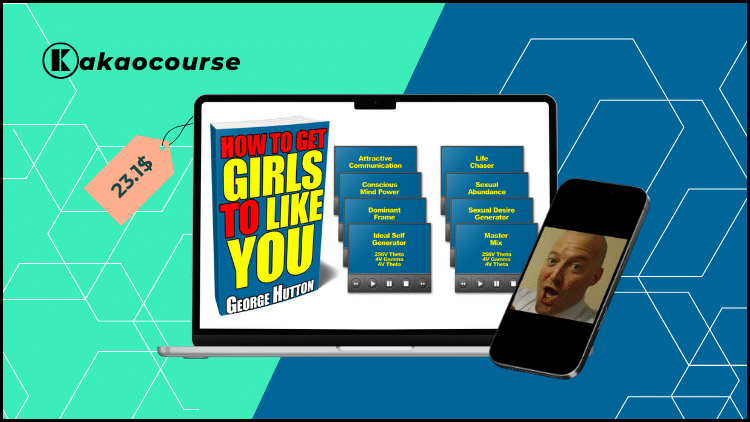
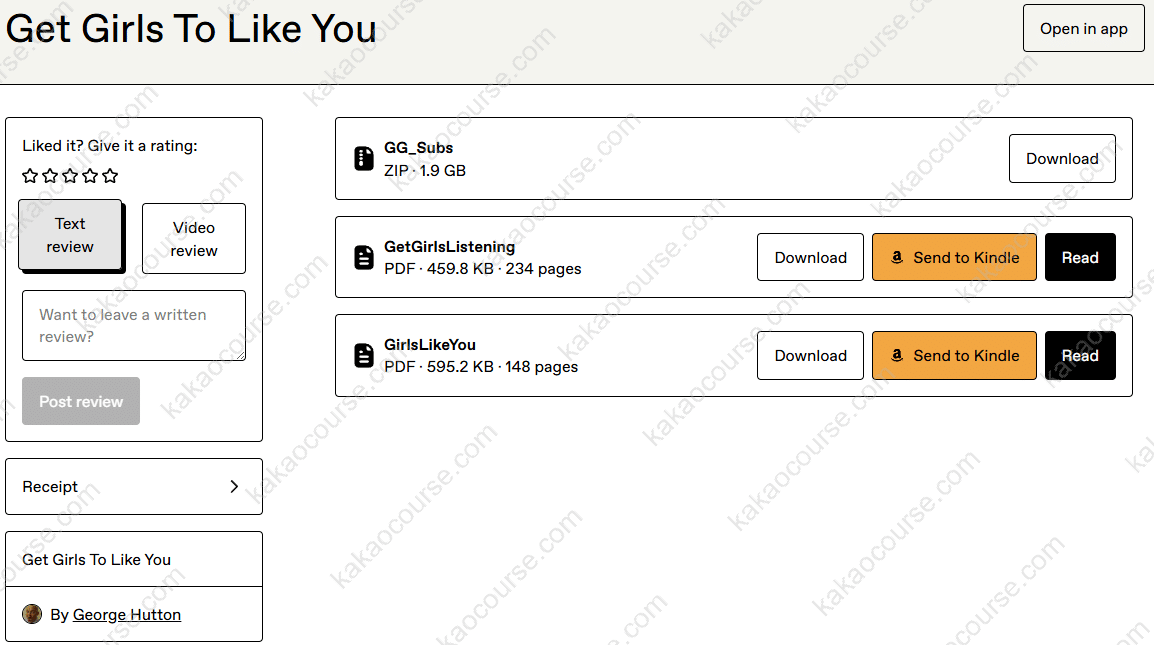
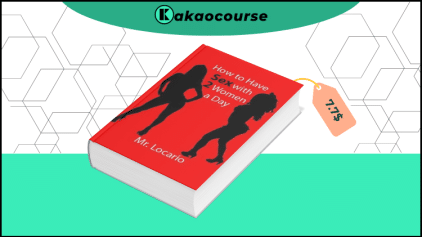

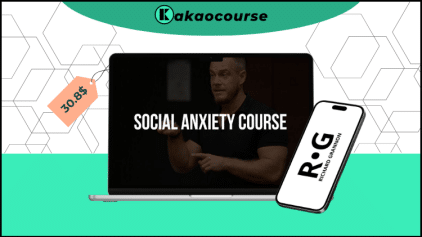
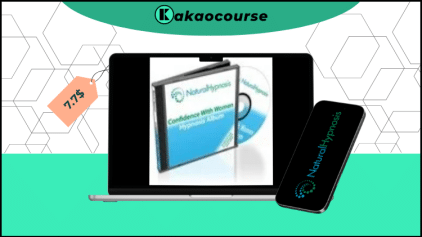



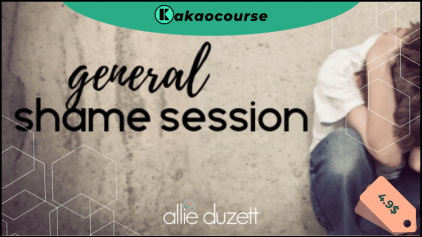
Reviews
There are no reviews yet.